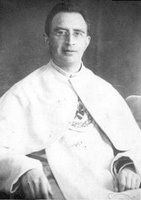 I will be gone today, so I wanted to post one meditation before I go for my readers. This is from the Diary of St. Faustina.
I will be gone today, so I wanted to post one meditation before I go for my readers. This is from the Diary of St. Faustina."During Holy Mass, I was so enveloped in the great interior fire of God's love and the desire to save souls that I do not know how to express it. I feel I am all aflame. I shall fight all evil with the weapon of mercy. I am being burned up by the desire to save souls. I traverse the world's length and breadth and venture as far as its ultimate limits and its wildest lands to save souls. I do this through prayer and sacrifice. I want every soul to glorify the mercy of God, for each one experiences the effects of that mercy on himself. The Saints in heaven worship the mercy of the Lord. I want to worship it even now, here on earth, and to spread devotion to it in the way that God demands of me....(745)
"The mercy of the Lord is praised by the holy souls in heaven who have themselves experienced that infinite mercy. What these souls do in heaven, I already will begin to do here on earth. I will praise God for His infinite goodness, and I will strive to bring other souls to know and glorify the inexpressible and incomprehensible mercy of God" (753).
Read more from the Diary of St. Faustina














